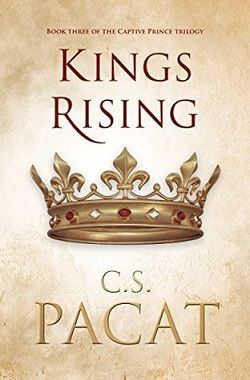Kings Rising, the third installment in C.S. Pacat's acclaimed Captive Prince trilogy, is a masterful culmination of political intrigue, complex character dynamics, and emotional depth. As the narrative unfolds, readers are thrust into a world where loyalty, betrayal, and the struggle for power intertwine, creating a rich tapestry that keeps one on the edge of their seat.
The story picks up with Damen, the rightful heir to the throne of Akielos, now revealed in his true identity. This revelation not only alters the stakes for Damen but also complicates his relationship with Prince Laurent, the man he has come to trust despite their tumultuous history. The tension between them is palpable, as Laurent has sworn to kill Damen, yet they must now forge an uneasy alliance to confront the looming threat posed by Kastor and the Regent's forces. This setup creates a compelling narrative tension that drives the plot forward.
One of the most striking aspects of Kings Rising is its exploration of trust and betrayal. Throughout the trilogy, Pacat has expertly navigated the complexities of trust, particularly in the context of power dynamics. In this final book, the stakes are higher than ever. Damen and Laurent's relationship is tested not only by external forces but also by their own insecurities and past traumas. The author delves deep into their psyches, revealing how their experiences shape their decisions and interactions. This psychological depth adds layers to their characters, making their journey towards mutual understanding and respect all the more poignant.
The theme of identity is also central to the narrative. Damen's struggle to reclaim his throne is not just a physical battle; it is also a journey of self-discovery. As he confronts his past and the expectations placed upon him, readers witness his evolution from a captive prince to a leader willing to fight for his people. Laurent, too, grapples with his identity, torn between his duty to his kingdom and his growing feelings for Damen. Pacat skillfully portrays their internal conflicts, making their eventual alliance feel both earned and inevitable.
Moreover, the world-building in Kings Rising is nothing short of exceptional. Pacat has created a vivid and immersive setting, rich with political intrigue and cultural nuances. The contrasting landscapes of Akielos and Vereck, along with the intricacies of their respective courts, serve as a backdrop for the characters' struggles. The author’s attention to detail enhances the reading experience, allowing readers to fully engage with the world and its inhabitants.
The pacing of the novel is expertly handled, with a balance of action and introspection. The battles are intense and well-crafted, showcasing Damen and Laurent's strategic minds as they navigate the treacherous waters of war. Yet, it is the quieter moments—those filled with tension and unspoken words—that truly resonate. Pacat's ability to shift between high-stakes action and intimate character moments is one of the book's greatest strengths, ensuring that readers remain emotionally invested throughout.
In terms of character development, Kings Rising excels in bringing closure to the arcs of its main characters. Damen and Laurent's relationship evolves from one of animosity and mistrust to a partnership built on mutual respect and understanding. Their journey is fraught with challenges, but it is also filled with moments of tenderness and vulnerability that highlight their growth. The supporting characters, too, are well-developed, each playing a crucial role in the unfolding drama. Their motivations and loyalties add depth to the narrative, making the stakes feel all the more real.
Pacat's writing style is both lyrical and accessible, drawing readers into the emotional landscape of the characters. The dialogue is sharp and often laced with subtext, reflecting the intricate power dynamics at play. The author’s ability to convey complex emotions through simple yet impactful language is commendable, allowing readers to connect deeply with the characters’ experiences.
As the trilogy comes to a close, Kings Rising not only delivers a satisfying conclusion to Damen and Laurent's story but also leaves readers contemplating the broader themes of power, loyalty, and the human capacity for change. It challenges the notion of what it means to be a ruler and the sacrifices that come with leadership. The resolution of the plot is both thrilling and emotionally resonant, providing a fitting end to a story that has captivated readers from the very beginning.
In comparison to other works in the genre, such as The Song of Achilles by Madeline Miller or The Traitor Baru Cormorant by Seth Dickinson, Kings Rising stands out for its unique blend of romance and political intrigue. While all three novels explore themes of identity and power, Pacat's focus on the intricacies of personal relationships within the context of broader political struggles sets it apart. The emotional stakes in Kings Rising are heightened by the characters' complex histories and the palpable chemistry between them, making it a compelling read for fans of both romance and fantasy.
In conclusion, Kings Rising is a triumphant finale that encapsulates the essence of the Captive Prince trilogy. C.S. Pacat has crafted a narrative that is as emotionally rich as it is thrilling, leaving readers with a sense of closure and a deeper understanding of the characters they have come to love. This book is a must-read for anyone who appreciates intricate storytelling, complex characters, and a beautifully rendered world. It is a testament to the power of love and trust in the face of adversity, making it a standout in contemporary fantasy literature.
























Reviews 0
Post a Reviews: